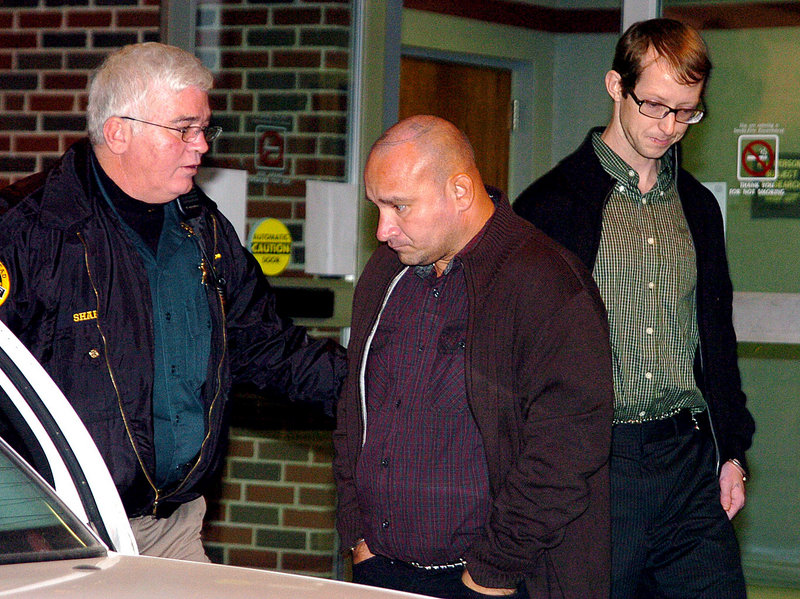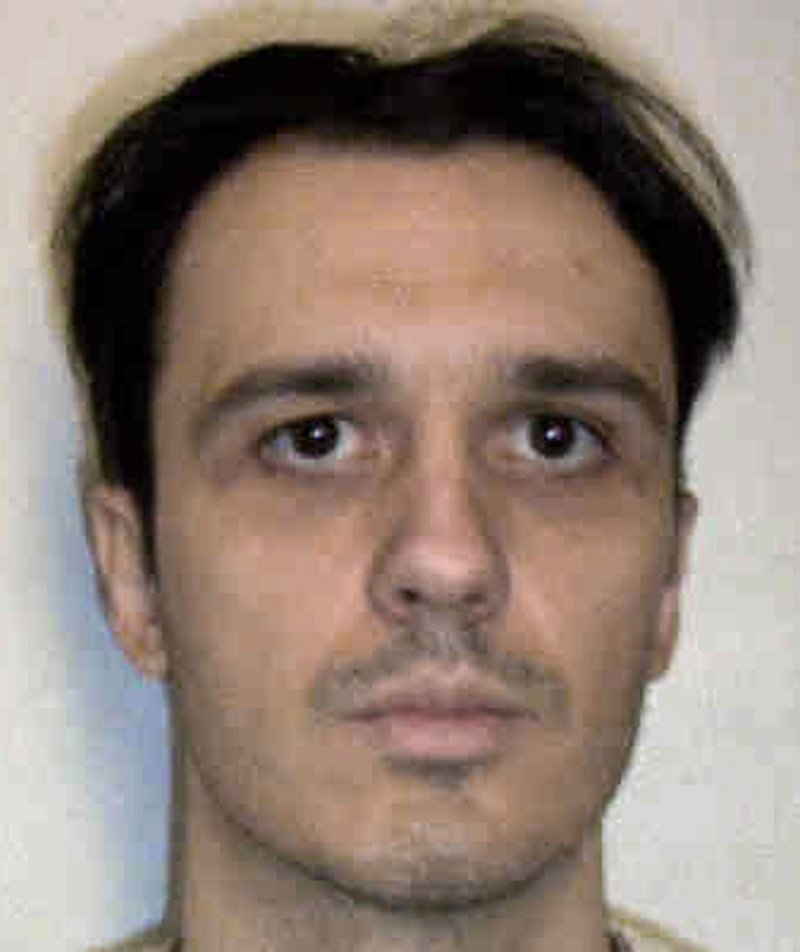LITTLE ROCK, Ark. – With the fervor of a religious revival, more than 2,000 people packed an auditorium in Little Rock and shouted alongside movie and music icons like Johnny Depp and Eddie Vedder: “Free the West Memphis Three!”
But the real star of the late August rally sat 75 miles away on Arkansas’ death row. He’s Damien Echols, sentenced to die for the horrific murder of three young boys 17 years ago; two other young men received life sentences in the case.
Supporters of the men, the so-called West Memphis Three — including hundreds who showed up at a candlelight prayer vigil at a church last week — argue there were two sets of victims from the May 5, 1993, crime: the three murdered 8-year-olds and Echols, Jason Baldwin and Jessie Misskelley, the then-teenagers who defenders claim were wrongly convicted in the deaths.
Prosecutors have insisted that the true killers are behind bars and that the evidence backs that conclusion. So far, courts have agreed. But doubts about the nightmarish case will not die, and they’re not coming only from celebrities.
After a hearing Thursday, the Arkansas Supreme Court is considering whether to grant Echols a new trial, weighing many issues: Did a juror commit misconduct? What’s the significance of a new analysis of DNA, which wasn’t tested before the trial?
Meanwhile, another question looms: If the West Memphis Three didn’t kill the boys, who did?
SIGNS OF FALSE CONFESSION
The killings of Steven Branch, Michael Moore and Christopher Byers were beyond shocking.
Three 8-year-old friends, all Cub Scouts, disappeared after school one weeknight while riding their bikes. Their bruised and bloodied bodies were found the next day in a wooded area known as Robin Hood Hills.
The outcry in the town of 28,000 across the Mississippi River from Memphis, Tenn., was immediate and intense.
“We were upset, mad at whoever did this to those children,” said Ann Powers, a 57-year-old cashier at a West Memphis Walmart. “We were trying to help the parents along as much as we could. Any information that came out was given to the police.”
As the town grieved, police began to zero in on Echols, a smart-mouthed 18-year-old high school dropout known for dressing in black, a dark sense of humor and love for heavy metal music.
But there was little movement until police brought in for questioning 17-year-old Jessie Lloyd Misskelley and he unexpectedly confessed, implicating himself, Echols and 16-year-old Jason Baldwin.
“Then they tied them up, tied their hands up,” Misskelley said in the statement to police, parts of which were tape-recorded. Describing violence, he went on: “And I saw it and turned around and looked, and then I took off running. I went home, then they called me and asked me, how come I didn’t stay? I told them, I just couldn’t.”
But attorneys for the men, along with Northwestern University’s Center on Wrongful Convictions and the National Association of Criminal Defense Lawyers, say Misskelley’s statements bear every sign of a false confession.
Misskelley, whose IQ was measured at 72, was simply saying what he thought police wanted to hear, said Steven Drizin, the Northwestern center’s legal director.
“It’s clear that Jessie Misskelley didn’t know what he was talking about, had never been to the crime scene, didn’t witness the crime scene,” and got key details wrong, Drizin said.
Misskelley told police they abducted the boys in the morning; by every account, the boys were in school all day. He also said they used rope to tie up the boys, rather than the shoelaces found on their bodies. He talked of Echols and Baldwin sexually attacking the boys, although an autopsy found no definitive evidence of sexual assault.
The three teenagers were arrested the day Misskelley spoke to police. He almost immediately recanted the confession, and his attorney said that Misskelley only said what he did because he thought he’d receive a reward.
Misskelley was tried alone, convicted of one count of first-degree murder and two counts of second-degree murder and sentenced to life in prison plus 40 years.
“There is no more powerful evidence in a court of law than a confession,” Drizin said.
Although Misskelley refused to testify against the others and his confession was not admitted into evidence, both were convicted. Echols got the death penalty and Baldwin received life without parole.
CONVICTION UPHELD
The three have had no luck in their bids for new trials.
The Arkansas Supreme Court upheld Echols’ conviction and death sentence in 1996, ruling there was sufficient evidence to prove he killed the three boys.
In Supreme Court arguments, defense attorney Dennis Riordan said DNA testing conducted after Echols’ conviction did not place Echols at the scene and that other scientific evaluation of evidence contradicts statements made in the confession. He asked the court to send the case back to circuit court for an evidentiary hearing or to grant a new trial.
Attorney General Dustin McDaniel declined an interview on the case. But in 2008, shortly after Echols filed the appeal now before the state Supreme Court, he said he was confident in the verdicts.
NO DNA MATCH
Damien Echols is a pro at interviews.
He’s told his story of what happened in 1993 many times before but still expresses astonishment at being accused and convicted.
“In hindsight, it just seems kind of ridiculous, I guess — when you’re saying that basically you’ve got this redneck trailer park devil cult going around, killing children for no apparent reason?” he said.
But if he, Baldwin and Misskelley didn’t kill the youngsters, who did?
The DNA analysis included in Echols’ court petition said that a hair found on the shoelaces used to bind victim Michael Moore was consistent with hair found from Terry Hobbs, the stepfather of victim Steven Branch.
Another hair found on a tree stump at the crime scene was consistent with hair from one of Hobbs’ friends, the court filing said. The men have vehemently denied any involvement.
None of the DNA tested from the crime scene matched Echols, Baldwin or Misskelley, the appeal said.
Even some of the victims’ parents have questioned whether the right people are behind bars for the crime.
“I don’t believe these guys could have killed these kids and not left any evidence,” Pam Hobbs, mother of Steven Branch, told The Jonesboro (Ark.) Sun earlier this year. “That’s impossible.”
Who then? There was another tantalizing thread of evidence.
On the night of the murders, a man entered a Bojangles fast-food restaurant less than a mile from where the bodies were discovered. He was covered in blood and mud, and his pants were soaked to the knee with water, according to the restaurant manager, who testified at both trials. The man went into the women’s restroom and restaurant workers called police. He was gone by the time police arrived.
Although restaurant workers cleaned the bathroom that night, West Memphis police did take blood scrapings a few days later when officers returned to investigate. That evidence, though, was lost before it was tested.
CELEBRITIES GET INVOLVED
The case might have slipped into obscurity were it not for “Paradise Lost: The Child Murders at Robin Hood Hills.”
A group of documentary filmmakers followed prosecutors, defense attorneys and families of the victims and suspects during the 1994 trials.
The film aired on HBO in 1996 and immediately sparked interest in the case. A sequel aired in 2000, and work on a third documentary is under way.
That’s how Pearl Jam’s Vedder and Natalie Maines, lead singer of the Dixie Chicks, learned of the case.
Maines donated money to the defense fund and later visited Little Rock to speak at a rally in support of the men.
Vedder was the driving force behind the Aug. 28 “Voices for Justice” rally in Little Rock that featured Maines, Depp, singer Patti Smith and musicians Ben Harper, Dhani Harrison and Joseph Arthur.
Vedder now considers Echols a friend and has visited him on death row.
But many who lived through the case say the celebrities haven’t followed the case closely enough.
Powers, the Walmart cashier, said she’s convinced the men are guilty and that Hollywood figures won’t change her view.
“They weren’t here,” Powers said. “These people, I hope they’re not disappointed in the end because they’re going to find out they went after a wrong cause.”
Send questions/comments to the editors.




Success. Please wait for the page to reload. If the page does not reload within 5 seconds, please refresh the page.
Enter your email and password to access comments.
Hi, to comment on stories you must . This profile is in addition to your subscription and website login.
Already have a commenting profile? .
Invalid username/password.
Please check your email to confirm and complete your registration.
Only subscribers are eligible to post comments. Please subscribe or login first for digital access. Here’s why.
Use the form below to reset your password. When you've submitted your account email, we will send an email with a reset code.